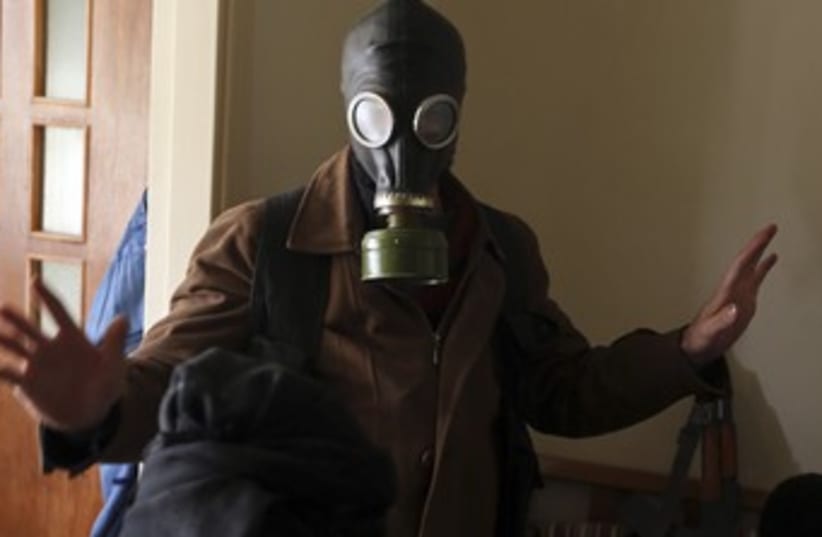But even as evidence of chemical weapon attacks by Assad’s regime continues to mount, forcing US acknowledgement, it has become clear the Obama administration’s red line has been scrubbed white. Meanwhile, the almost four-decade period of silence in the Golan Heights is rapidly being replaced by echoes of a too-close civil war.
The most recent massacre to spark international discussion occurred as reports indicated a chemical weapon attack on March 19 in Aleppo’s northern province of Khan al-Asal; both the FSA and the Assad regime immediately blamed each other for the attack. Reportedly, two Scud-like missiles were launched toward civilians, massacring over two dozen and wounding others.At a press conference in Israel in March, President Obama denied claims of chemical weapon usage. He did, however, decry “deeply skeptical” regime claims of rebel usage, citing a lack of capability to launch such an attack. It is notable to point out he refused to verify claims of chemical weapons usage while standing several feet from Prime Minister Binyamin Netanyahu – whose own official verified the chemical weapons claims earlier that same day.Israel’s minister of intelligence and strategic affairs, Yuval Steinitz, acknowledged chemical weapons had been used, stating that “it is apparently clear” the Syrian regime had done so.Now, US officials have vaguely acknowledged evidence of chemical weapon usage by the Assad regime with Defense Secretary Chuck Hagel stating, US intelligence has confirmed usage with “varying degrees of confidence.”While verbose discussion of red lines and admonishments of disgust continue to ricochet around the press circuit, the mere fact that there was an international scramble to assess if chemical weapons were used should have prompted a much quicker response from DC, but it has not.The latest report of Israeli confirmation (and perhaps veiled criticism of US inertia) came on April 23 in Tel Aviv during a security conference at the Institute for National Security Studies. Israel’s head of the Research and Analysis Division at the IDF Military Intelligence Directorate Brig.-Gen.Itai Brun announced that it was a “fact” that chemical weapons were used and that moreover, Syria has over 1,000 metric tons of chemical weapons.In the colorful mosaic of reasons to more comprehensively play a role in the transition of power in Syria, one of the brightest pieces pertains to international security – especially Israel’s. Already, Israel has begrudgingly involved itself in the Syrian conflict by occasionally retaliating for shelling and gunfire spillovers. In late January, Israel bombed a weapons caravan that in all likelihood was creeping toward Hezbollah hands.Meanwhile, against the backdrop of the ongoing cycle of tenuous gains being made by the Free Syrian Army throughout Syria, only to be met with deadly Assad force blowback, al-Qaida-affiliated rebels like Jabhat al-Nusra and the Yarmouk Martyrs Brigade inch closer to the border with Israel; potentially deadly spillover is no longer a remote possibility, it’s a near future inevitability.Despite Israel’s vigilance, with continued US inertia a scenario where the Assad regime’s unsecured weaponry falls into the hands of Hezbollah or an al-Qaida affiliate grows increasingly likely. Further, attempts by the Assad regime to transfer weapons to secure locales in Lebanon remain imminent, which in turn guarantees an Israeli response.Meanwhile, despite President Obama’s continued push for diplomatic talks with Iran, Netanyahu appears unlikely to depart from his commitment regarding a preemptive strike. Here is where DC misses a pivotal and strategic opportunity: helping to defeat the Assad regime could in turn effectively cut off the Iranian limb of Hezbollah that would undoubtedly attempt to stretch out a hand over Israel in case of a strike on Tehran’s nuclear facilities.If Iran can no longer utilize Syria to transport weapons to Hezbollah and train militants, the entire trifecta could dissipate.President Obama’s wait-and-see approach to Syria has not been met with nearly as much criticism as it should; US inertia on Syria has been buoyed by domestic and collective reluctance stemming from vivid memories of past failures in the Middle East; this perspective will continue to prove short-sighted as the Levant becomes increasingly destabilized and the US grows more inclined to thwart a potentially future jihadist state on the border of its greatest ally.The fears of US-provided weapons in jihadist hands are relevant, but as Assad’s weaponry becomes increasingly unsecured it makes little sense as to why those weapons would not also be up for grabs.As the bloody conflict continues to unravel the last remnants of stability in Syria, the Obama administration’s hesitation to act on its own red line harms not only credibility with the Syrian people, but jeopardizes the security of Syria’s neighbors.President Obama’s wait-and-see approach was only acceptable when the imaginable unknowns seemed scarier than the unfolding reality; this is clearly no longer the case.The writer is a freelance geopolitical analyst currently based in Tel Aviv who has written for The Times of Israel, Ynet, Hurriyet Daily and others.
President Obama’s perpetually fading red line
Obama has treated the bloody Syrian conflict like a geopolitical Pandora’s box that he dare not touch.
